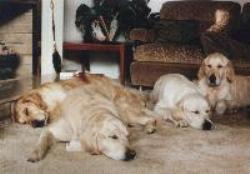Buying a Puppy
The Golden Retriever is an excellent choice for a family pet, and though a sporting breed, it is one of the most adaptable. A Golden can be all things to all people, from fulfilling its original function in the shooting field, to service dog for search and rescue, guide dog, hearing dog for the deaf and working dog for the police and customs.
Most are intelligent, unfailingly cheerful and gentle making them ideal companions for families with children. As family pets they can be taught to compete successfully in obedience, agility and working trials as well as in the show ring.
There are, however several points to bear in mind before you purchase your new puppy. Owning a puppy is a responsibility requiring a serious commitment from all members of the family, for this will be a partnership that can last anything up to 12 – 15 years. Perhaps at this point we ought to remind you of a few of their less attractive traits.
- Goldens shed their coats frequently and copiously. Do not buy one if you are house-proud, have pale coloured carpets or a dodgy vacuum cleaner.
- Goldens are large dogs with an uncanny knack of finding all the muddiest puddles. Some are great wallowers – yours is bound to be one of them!
- Faeces are a by-product of all dogs, which we all have to dispose of responsibly. It is one of the more unpleasant facts of dog ownership, and most public places now require you, by law, to pick up after your dog.
- A well-bred and properly reared puppy will cost upwards of £1800 and this is only the beginning. Veterinary fees are expensive, so it makes sense to insure your dog, indeed most breeders will insist you do so.
- A male golden retriever will mature into a large dog, reaching as much as 24″ at the shoulder and can weigh anything up to 80lbs – a sizeable amount when it is attempting to climb up into your lap for a cuddle.
- Goldens do not make good kennel dogs, most are real couch potatoes, who unerringly find the most comfortable sofas and the choicest position in front of the fire.
- Some Goldens are great landscape architects, if your garden is a show piece, having your own Ground Force team may not go down too well. The garden must also be well fenced with sturdy boundaries, puppies will always find the smallest gap to squeeze through.
- Although usually tractable and obedient, given an inch, most will take the whole nine yards!
If you still insist that a Golden is the dog for you, read on.
Choosing your puppy.
Always buy from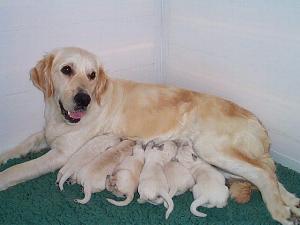 a breeder where you can see the mother with her puppies. This will give you an idea of how the puppies will turn out. If the breeder does not own the stud dog, ask to see photographs of him. Make sure that both the sire and the dam of the puppies have the appropriate health clearances, and ask to see the certificates. Click below for an explanation of the current health schemes.
a breeder where you can see the mother with her puppies. This will give you an idea of how the puppies will turn out. If the breeder does not own the stud dog, ask to see photographs of him. Make sure that both the sire and the dam of the puppies have the appropriate health clearances, and ask to see the certificates. Click below for an explanation of the current health schemes.
Reputable breeders will have their puppies checked out by their veterinary surgeon prior to sale and bear in mind you may be asked to sign a sales contract.
Check out the puppies’ living quarters. Are they scrupulously clean? Is the breeder making provision for proper socialisation of the litter? Are the puppies happy and out-going, with clear eyes and skin?
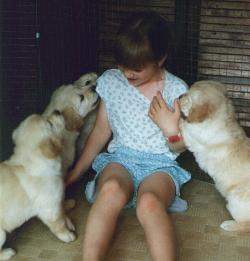
If yours is a family with very young children, do not go for the cute, shy puppy sitting on his own in the corner. Opt for the middle-of-the-road puppy that interacts well with his siblings, is lively and happy without being too dominant, bold or brash. A Golden puppy should be confident and interested to explore his surroundings.
If colour is important to you, bear in mind the puppies will all look considerably lighter at this age than they will end up. The colour of their ears gives an approximate guide to their ultimate colour. Be guided by the breeder, who will have spent many hours with the puppies and will be able to advise you about a puppy’s temperament. What may appear to be a quiet puppy may be the life and soul of the litter who has just had a mad half hour and worn himself out!
Make sure you have been given all the Kennel Club documentation and copies of all appropriate health clearances with the puppy, an advice sheet and diet sheet. Stick to the diet suggested by the breeder until the puppy has settled well into his new home before you make any changes. Well bred puppies should also be Kennel Club Registered, this is proof of lineage. There is no reason not to register a litter, it cost very little. Be wary of breeders offering puppies un-registered. Puppies should also come with advice on worming, vaccination and some breeders offer a insurance cover note to cover pups for first few weeks.
Do your homework. Buy, or borrow from the library, all the books you can on Goldens. Puppies do not sit gift wrapped on a shelf – be prepared to wait for the puppy of your choice.
Your children and your puppy
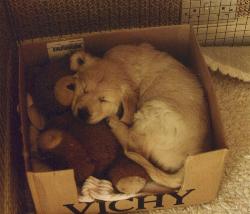 Provide the puppy with its own bed and do not allow the children to disturb the puppy when it is sleeping. The bed should be the puppy’s own private space where it can rest unmolested. A cardboard box makes an excellent ‘starter’ bed and can be replaced with a slightly larger version when chewed. Always make sure there are no staples that the puppy could swallow.
Provide the puppy with its own bed and do not allow the children to disturb the puppy when it is sleeping. The bed should be the puppy’s own private space where it can rest unmolested. A cardboard box makes an excellent ‘starter’ bed and can be replaced with a slightly larger version when chewed. Always make sure there are no staples that the puppy could swallow.
Do not allow young children to pick up the puppy. Make sure they are sitting on the floor and then the puppy can be placed in the child’s lap for a cuddle. Do not allow very young children to play with the puppy unsupervised.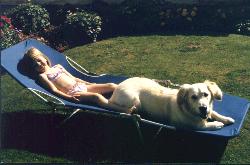
Do not allow children to become over excited around the puppy. This means no screaming, no jumping and no fighting.
Do not allow young children to feed the puppy or disturb the puppy while it is eating.
Do not allow yanking, pulling or tugging, a young puppy’s bones are delicate and not properly formed until it is several months old. Damage done at this stage could have disastrous effects for the rest of the puppy’s life.
The First Night
The first night is always a little fraught. It will be the first time your puppy has been separated from his mother and siblings, so expect him to cry a little and do not be unduly alarmed when he does so.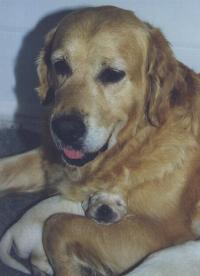 Be calm and matter of fact, do not excite the puppy and make sure it has relieved itself before putting it to bed.
Be calm and matter of fact, do not excite the puppy and make sure it has relieved itself before putting it to bed.
Most breeders will have given you a small piece of blanket with the scent of his family on it, that you can put inside his bed and which will help to settle the puppy. Provide a warm comfortable blanket such as Vet Bed, which is hard-wearing and easily cleaned. Place the puppy’s bed in a comfortable, warm place that can be easily cleaned, such as a kitchen or utility room. Dogs are den animals and so prefer their bed to be tucked in a corner.
Some puppies will already be ‘toilet trained’ by the breeder, follow their guidance if toilet pads are used, they should be placed by the door into the garden to give your puppy an idea of where to ‘go’. Don’t expect him to be clean overnight. Don’t make the mistake of taking the puppy to bed with you, you will make a rod for your own back!
House Training
As a rule Goldens learn quite quickly and although at times it seems as though they will never be clean, most are by around four months. Puppies are not really capable of controlling bladder function much before this time, so anticipation and vigilance on your part is of prime importance. Dogs are creatures of habit and like to ‘go’ in the same place. So as soon as you arrive home with your new pup carry him straight to the spot in the garden and stay with him until he has performed, use a word like ‘hurry up’ to encourage him, then make a fuss of him when he goes, then he can go and explore his new home.
The odd accident is an inevitable part of house training your puppy, so be prepared to experience it. Remember, prevention is better than cure! View accidents as a lack of vigilance on your part. Times to watch are after a meal and a sleep. An eight-week-old puppy can spend a penny for England, so be warned!
Training
Training should start as soon as you arrive home. Have one set of rules for all the family and stick to them. Puppies, like young children, need routine and firmly established ground rules. Goldens are good with children, but make sure your children are taught to be caring and responsible with dogs. A puppy is a living, breathing, real-life creature, not a toy and should be treated with respect.
Remember that these dogs are retrievers, 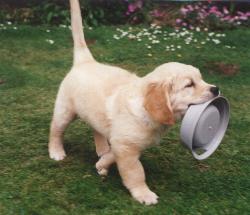 so it would be going against their nature if they were never allowed to pick things up. Many are great ‘carriers’ of household objects: toys or one’s arm or sleeve. All puppies chew: It is a natural process that enables baby teeth to be expelled. Gentle removal of an unsuitable item and substitution of the puppy’s own toy will leave your dog without any feeling of having committed a major crime.
so it would be going against their nature if they were never allowed to pick things up. Many are great ‘carriers’ of household objects: toys or one’s arm or sleeve. All puppies chew: It is a natural process that enables baby teeth to be expelled. Gentle removal of an unsuitable item and substitution of the puppy’s own toy will leave your dog without any feeling of having committed a major crime.
If anything precious gets spoiled it is your own fault. REMEMBER – ANTICIPATION AND VIGILANCE.
Your puppy is an instinctive animal. There is no point in getting cross if your puppy chews things if he is unsupervised for long periods The Devil makes work for idle paws! If you do have to be away from home for more than a couple of hours, you will need to arrange for a puppy-sitter.
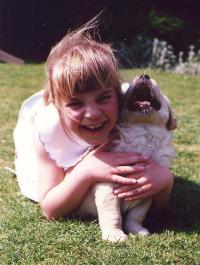
Though Goldens are usually extremely biddable and kind to people, children and other animals, as youngsters they can be lively and boisterous and appear to be in trouble more than they are out of it. Your puppy has no concept of the social graces unless you teach it, and people usually get the dogs they deserve. We strongly recommend obedience classes for you and your puppy to learn to become responsible members of society. Your breeder will be able to advise you of local classes.
The very first lesson should be for the puppy to learn his own name and to come when called. There is nothing more infuriating than a dog that won’t do so. When the pup is feeling insecure in his new home, he won’t venture far from your side. Call him and make a fuss of him when he bounds over and give him a food reward. he will soon get the idea and learn his name and ‘come’. Hopefully by the time he has gained the confidence to go off exploring, the lesson will have been learnt and the thought of a treat will bring him back.
If he won’t come back, keep calm and praise him when he finally comes, even though it may have taken him ages! If he is told off at this point he will associate the punishment with coming to you, not the fact that it was in his own time.
NEVER hit a young puppy; violence solves nothing and your dog will associate pain to being with you and it will take weeks of patience to win him round again.
Teach your puppy to accept you as his new pack-leader and that what you say goes. Use short one-word commands, but try to make learning fun.
If you have a dominant, greedy puppy who guards his food, hand feeding him for several meals often works. If the puppy growls and guards a prized possession, remove the article and spend time giving the item back and then gently removing it again, until the puppy accepts your supremacy.
Exercise
Initially, a play in your garden is quite sufficient for your new puppy. 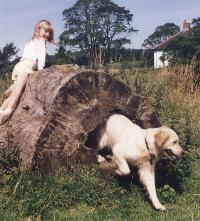 After he has received his vaccinations, start with 10 to 15 minutes exercise off the lead in a safe area allowing him to set the pace.
After he has received his vaccinations, start with 10 to 15 minutes exercise off the lead in a safe area allowing him to set the pace.
Exercise can be increased as the puppy grows, but very gradually. Remember your puppy is growing at an alarming rate and over-exercise and too boisterous play can cause damage to joints and cartilage later on. A good way to monitor exercise is a guide of 5 minutes for each month of the puppies life, ie: at 3 month 15 minutes lead exercise twice a day, which is then increased every month by 5 minutes.
Take it slowly at first, and by the time your dog is 12 to18 months old he will be able to take all the exercise you care to give him, and more.
Vaccinations
Consult your veterinary surgeon, as vaccination programs differ between practices, but generally your puppy will receive his first injection against Parvo Virus at about 8+ weeks.
Until last injection has taken effect, he should not leave the confines of your garden, unless he is carried.
Worming
The breeder, using a proprietary brand of wormer should have wormed your puppy at least three times. Even so, it makes sense to be certain that children wash their hands after playing with the puppy and before eating. Follow your breeders advice on future worming. Ask your Vet for a recommended brand of wormer.
Grooming
Groom your puppy every day. This not only helps to keep him clean, but also establishes a bond between the two of you. Get your puppy used to having his ears looked at, his feet picked up and his teeth checked on a daily basis, so that any veterinary examination, should it be necessary at a later date, will not be too much of an ordeal. Initially, grooming will just consist of a thorough brushing, though later as the adult coat and feathering comes through, a daily check for knots and tangles will become necessary. Keeping the nails cut & feet tufts trimmed with scissors will help to keep down the dirt brought into the house, if you struggle with doing nails, get a groomer or vet nurse will help, but persevere as the more the feet are handled the easier it will be as your puppy gets used to it.
And Finally
With just a little effort and training, your puppy will mature into a wonderful companion and a fully fledged member of the family that you can take anywhere and whom you will be proud to own. Don’t forget to keep the breeder informed of your puppy’s progress, a photograph is always appreciated.
Should the unthinkable happen and your circumstances change and you are unable to keep your puppy or older dog any longer, please remember to inform the breeder in the first instance, as some do have a return policy written into their contracts.

